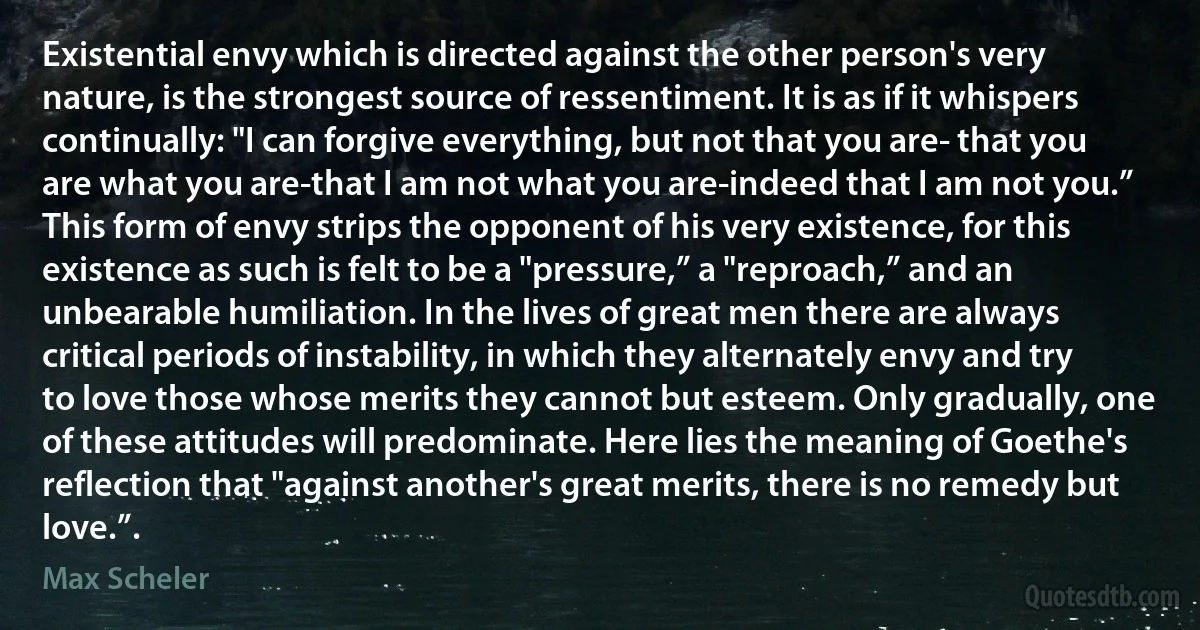
Existential envy which is directed against the other person's very nature, is the strongest source of ressentiment. It is as if it whispers continually: "I can forgive everything, but not that you are- that you are what you are-that I am not what you are-indeed that I am not you.” This form of envy strips the opponent of his very existence, for this existence as such is felt to be a "pressure,” a "reproach,” and an unbearable humiliation. In the lives of great men there are always critical periods of instability, in which they alternately envy and try to love those whose merits they cannot but esteem. Only gradually, one of these attitudes will predominate. Here lies the meaning of Goethe's reflection that "against another's great merits, there is no remedy but love.”.
Max SchelerRelated topics
envy everything existential felt form great humiliation instability men lives love meaning nature reflection remedy source try lies ressentimentRelated quotes
A great many individuals ever since the rise of the mathematical method, have, each for himself, attacked its direct and indirect consequences. ...I shall call each of these persons a paradoxer, and his system a paradox. I use the word in the old sense: ...something which is apart from general opinion, either in subject-matter, method, or conclusion. ...Thus in the sixteenth century many spoke of the earth's motion as the paradox of Copernicus, who held the ingenuity of that theory in very high esteem, and some, I think, who even inclined towards it. In the seventeenth century, the depravation of meaning took place... Phillips says paradox is "a thing which seemeth strange"-here is the old meaning...-"and absurd, and is contrary to common opinion," which is an addition due to his own time.

Augustus De Morgan
Pleasure, the outer edge of ecstasy, was in the dour days of Protestantism, considered sinful in itself, wherever gained; Rome held specifically that any or all sexual pleasure was sinful. And for all this capped volcano produced in terms of bridges and houses, factories and bombs, it gouted from its riven sides a frightful harvest of neurosis. And even where a nation officially discarded the church, the same repressive techniques remained, the same preoccupation with doctrine, filtered through the same mesh of guilt. So sex and religion, the real meaning of human existence, ceased to be meaning and became means; the unbridgeable hostility between the final combatants was the proof of the identity of their aim-the total domination, for the ultimate satisfaction of the will to superiority, of all human minds.

Theodore Sturgeon
Have not many of us, in the weary way of life, felt, in some hours, how far easier it were to die than to live?
The martyr, when faced even by a death of bodily anguish and horror, finds in the very terror of his doom a strong stimulant and tonic. There is a vivid excitement, a thrill and fervor, which may carry through any crisis of suffering that is the birth-hour of eternal glory and rest.
But to live, - to wear on, day after day, of mean, bitter, low, harassing servitude, every nerve dampened and depressed, every power of feeling gradually smothered, - this long and wasting heart-martyrdom, this slow, daily bleeding away of the inward life, drop by drop, hour after hour, - this is the true searching test of what there may be in man or woman.

Harriet Beecher Stowe
Babbitt looked up irritably from the comic strips in the Evening Advocate. They composed his favorite literature and art, these illustrated chronicles in which Mr. Mutt hit Mr. Jeff with a rotten egg, and Mother corrected Father's vulgarisms by means of a rolling-pin. With the solemn face of a devotee, breathing heavily through his open mouth, he plodded nightly through every picture, and during the rite he detested interruptions. Furthermore, he felt that on the subject of Shakespeare he wasn't really an authority. Neither the Advocate-Times, the Evening Advocate, nor the Bulletin of the Zenith Chamber of Commerce had ever had an editorial on the matter, and until one of them had spoken he found it hard to form an original opinion.

Sinclair Lewis
You well know ... for which reason I began searching for a number of demonstrations proving a statement due to the ancient Greeks ... and which passion I felt for the subject ... so that you reproached me my preoccupation with these chapters of geometry, not knowing the true essence of these subjects, which consists precisely in going in each matter beyond what is necessary. ... Whatever way he [the geometer] may go, through exercise will he be lifted from the physical to the divine teachings, which are little accessible because of the difficulty to understand their meaning ... and because the circumstance that not everybody is able to have a conception of them, especially not the one who turns away from the art of demonstration.

Al-Biruni
